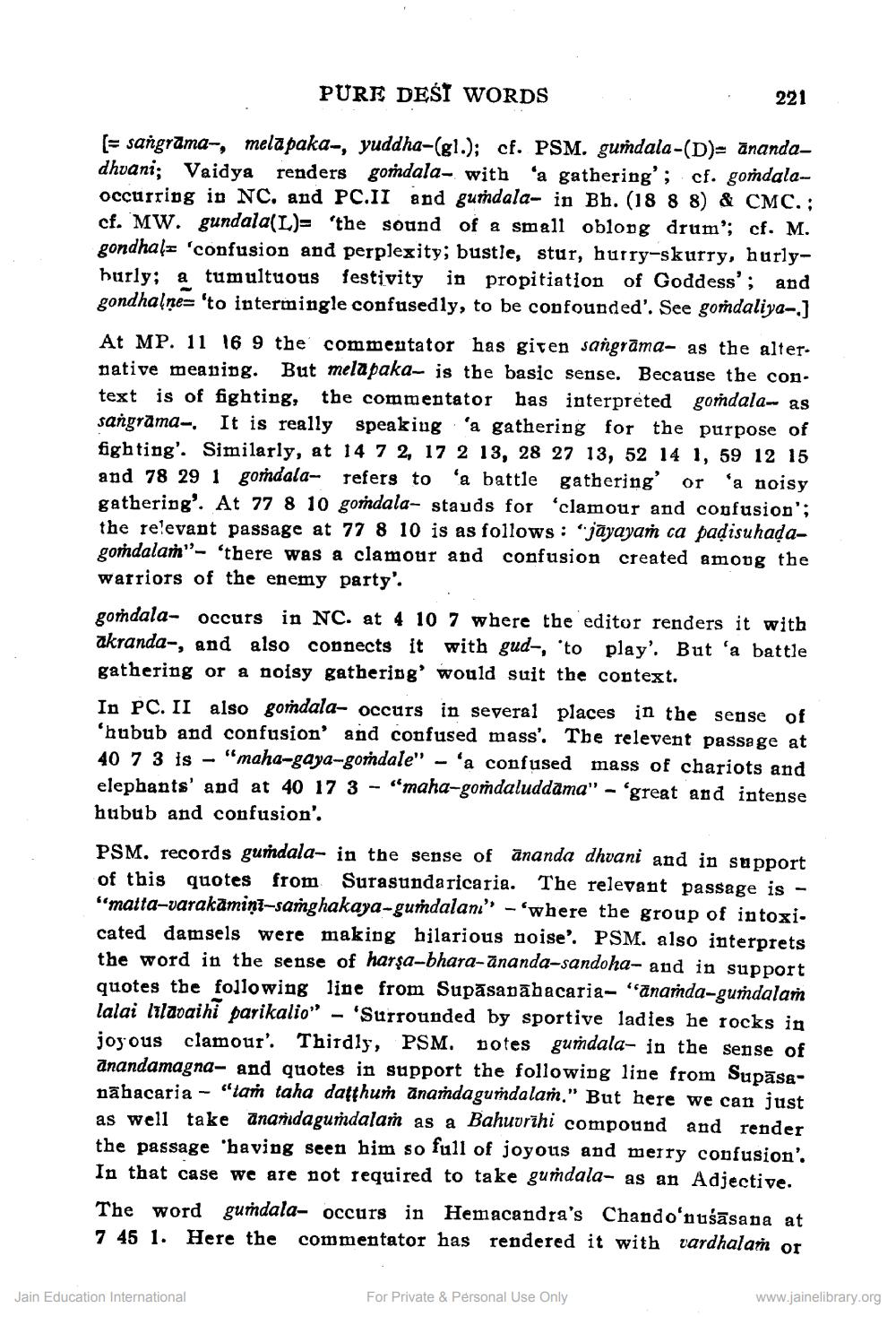________________
PURE DESI WORDS
[= sangrama-, melapaka-, yuddha-(gl.); cf. PSM. gumdala-(D)= anandadhvani; Vaidya renders goṁdala- with 'a gathering'; cf. goṁdalaoccurring in NC. and PC.II and gumdala- in Bh. (18 8 8) & CMC.; cf. MW. gundala(L)= 'the sound of a small oblong drum'; cf. M. gondhal 'confusion and perplexity; bustle, stur, hurry-skurry, hurlyburly; a tumultuous festivity in propitiation of Goddess'; and gondhalne 'to intermingle confusedly, to be confounded'. See gomdaliya-.]
At MP. 11 16 9 the commentator has given sangrama- as the alternative meaning. But melapaka- is the basic sense. Because the context is of fighting, the commentator has interpreted goṁdala- as sangrama-. It is really speaking a gathering for the purpose of fighting'. Similarly, at 14 7 2, 17 2 13, 28 27 13, 52 14 1, 59 12 15 and 78 29 1 goṁdala- refers to 'a battle gathering' or 'a noisy gathering'. At 77 8 10 goṁdala- stauds for 'clamour and confusion'; the relevant passage at 77 8 10 is as follows: "jayayam ca paḍisuhaḍagomdalam"- "there was a clamour and confusion created among the warriors of the enemy party'.
221
gomṁdala- occurs in NC. at 4 10 7 where the editor renders it with akranda-, and also connects it with gud-, 'to play'. But 'a battle gathering or a noisy gathering' would suit the context.
In PC. II also goṁdala- occurs in several places in the sense of 'hubub and confusion' and confused mass'. The relevent passage at 40 7 3 is "maha-gaya-goṁdale" - 'a confused mass of chariots and elephants' and at 40 17 3 - "maha-goṁdaluddāma" - 'great and intense hubub and confusion'.
-
PSM. records gumdala- in the sense of ananda dhvani and in support of this quotes from. Surasundaricaria. The relevant passage is - "matta-varakāmini-samghakaya-gumdalanı" - 'where the group of intoxicated damsels were making hilarious noise'. PSM. also interprets the word in the sense of harsa-bhara-ānanda-sandoha- and in support quotes the following line from Supasanahacaria- "anamda-gumdalam lalai lilavaihi parikalio" - 'Surrounded by sportive ladies he rocks in joyous clamour'. Thirdly, PSM. notes gumdala- in the sense of anandamagna- and quotes in support the following line from Supāsanahacaria "tam taha datthum anaṁdagumdalam." But here we can just as well take anamdagumdalam as a Bahuvrihi compound and render the passage having seen him so full of joyous and merry confusion'. In that case we are not required to take gumdala- as an Adjective. The word gumdala- occurs in Hemacandra's Chando'nusasana at 7 45 1. Here the commentator has rendered it with vardhalam or
Jain Education International
For Private & Personal Use Only
www.jainelibrary.org




